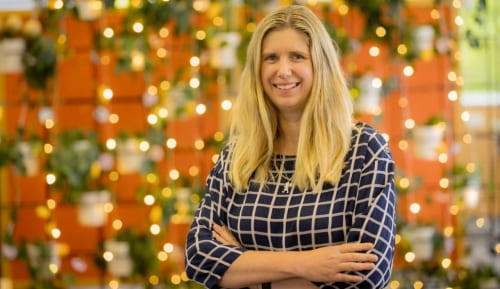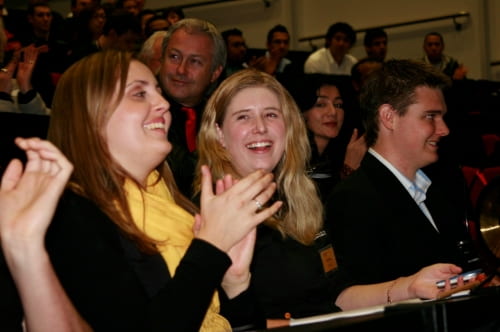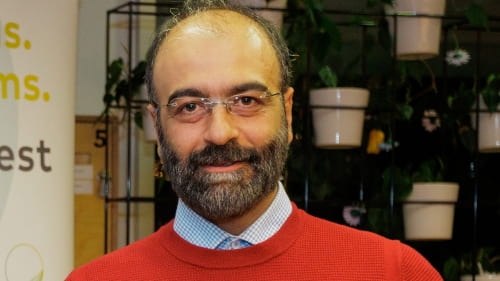
NEWSROOM
20 years of innovation
3 January 2024
By Shreta Rayan
2023 was a big year for the Centre for Innovation and Entrepreneurship’s Velocity programme, but it was historic for another reason – 20 years since the initiative was created.
The Centre for Innovation and Entrepreneurship’s (CIE) Velocity programme thrived this year. Not only did the initiative see record number of applications this year for its $100k Challenge start-up planning competition, but it was also named the Academic Initiative of the Year at the 2023 Global Entrepreneurship Network New Zealand Awards. A significant milestone as the programme celebrates 20 years.
Formed in 2003, Velocity – or Spark as it was known in its early days – was modelled on similar initiatives delivered in renowned universities abroad. Velocity emerged at a time when New Zealand’s GDP and overall place in the OECD was precarious.
The programme was informed by findings from the 2001 Knowledge Wave Conference which highlighted that NZ should redefine itself as a knowledge-based economy. Ultimately the goal was big – to cement our identity as an entrepreneurial university on par with Harvard, Cambridge and Massachusetts Institute of Technology (MIT).
Little has changed over the 20 years
With a storied history spanning across two decades, it’s tempting to assume the Velocity programme underwent significant evolution over the years.But Darsel Keane, current Director for the CIE and former member of the Challenge’s student committee (2006), maintains little has changed.
“The essence of the programme remains the same as it did in 2003,” she says, “Velocity still strives to create a prosperous New Zealand, where our start-ups still aim to make meaningful environmental and economic impact on the country.”
“What has changed,” Darsel continues, “is the support Velocity has received in the last few years, with more support from the University and its commercial arm, UniServices.”
Prior to 2016, Velocity was primarily student-led with support from the University.
While the initiative continues to be led by a student committee, in recent years it secured support from alumni and businesses outside of the University, indicating a shift in how entrepreneurship is perceived in New Zealand’s economic scene.
As entrepreneurial outlook grew in New Zealand, so did the popularity of the initiative within the University, with 60 to 80 business teams entering the challenge.
Velocity is primarily coordinated and organised by Kirsten Beckman, who is the CIE’s Programme Advisor.
“It’s been wonderful to be a part of so many students’ and staff members’ journeys,” says Kirsten, “In 2023, we had the highest number of $100k Challenge entries in Velocity’s 20-year history, so entrepreneurship is definitely alive and well on campus!”
Entrepreneurship and perceptions around it are shifting
When asked about the changes she’s seen in some of the latest ventures entering, Kirsten reflects on how entrepreneurship shifted over the years from innovation to making impactful changes to the world.
“Many more nascent entrepreneurs are focused on social and environmental issues, which is very encouraging to see. It’s no longer just about creating the next big thing, but also about driving positive change and creating a lasting impact on the world.”
Last year’s winners, Neurofanos, are certainly on their way to making an impact in the field of surgery. A venture designed to revolutionise brain surgery using artificial intelligence, Neurofanos won $25000 in seed funding at last year’s $100K Challenge.
In addition to the funding, the venture also gained access to CIE’s Venture Lab incubation programme, which gave them the invaluable opportunity to be mentored an experienced entrepreneur.
Dr Hamid Abbasi, one of the founders and CEO of Neurofanos, says the mentorship opportunity was instrumental in enabling the venture to reach the next level after winning the challenge.
“Getting advice on how to best organise the project and the team, all while obtaining a vision to set ourselves up for long-term success, was extremely valuable,” says Dr Abbasi. Using Venture Lab as a stepping stone, Dr Abbasi and his team managed to secure a further $1 million in funding making the venture one step closer to revolutionising brain surgery.
Velocity in the next 20 years
“We provide a range of resources and facilities for students and staff to nurture and foster their entrepreneurial journey, such as coaching from industry and business leaders. At the end of the day, we want all start-ups to succeed,” Darsel says.
When asked about what Velocity may look like in the next 20 years, Darsel remains optimistic that it won’t change in its aim and function.
“I imagine it’ll continue to be primarily student-led,” she says, “the model has been successful in the last 20 years and Velocity will still be successful 20 years from now. The University is a powerhouse of creativity – our staff and students come from diverse backgrounds and Velocity is one of the many resources we can use to optimise this.”
While the challenge was created with the aim to redefine the nation’s economic identity, it ultimately created a community of thinkers and change-makers, both within New Zealand and beyond.
Ultimately, the enduring relevance of Velocity shows that there is no limit to creativity and innovation – the entrepreneurial spirit will endure even in the face of the unknown.
Related stories






3 January 2024
By Shreta Rayan
2023 was a big year for the Centre for Innovation and Entrepreneurship’s Velocity programme, but it was historic for another reason – 20 years since the initiative was created.
The Centre for Innovation and Entrepreneurship’s (CIE) Velocity programme thrived this year. Not only did the initiative see record number of applications this year for its $100k Challenge start-up planning competition, but it was also named the Academic Initiative of the Year at the 2023 Global Entrepreneurship Network New Zealand Awards. A significant milestone as the programme celebrates 20 years.
Formed in 2003, Velocity – or Spark as it was known in its early days – was modelled on similar initiatives delivered in renowned universities abroad. Velocity emerged at a time when New Zealand’s GDP and overall place in the OECD was precarious.
The programme was informed by findings from the 2001 Knowledge Wave Conference which highlighted that NZ should redefine itself as a knowledge-based economy. Ultimately the goal was big – to cement our identity as an entrepreneurial university on par with Harvard, Cambridge and Massachusetts Institute of Technology (MIT).
Little has changed over the 20 years
With a storied history spanning across two decades, it’s tempting to assume the Velocity programme underwent significant evolution over the years.But Darsel Keane, current Director for the CIE and former member of the Challenge’s student committee (2006), maintains little has changed.
“The essence of the programme remains the same as it did in 2003,” she says, “Velocity still strives to create a prosperous New Zealand, where our start-ups still aim to make meaningful environmental and economic impact on the country.”
“What has changed,” Darsel continues, “is the support Velocity has received in the last few years, with more support from the University and its commercial arm, UniServices.”
Prior to 2016, Velocity was primarily student-led with support from the University.
While the initiative continues to be led by a student committee, in recent years it secured support from alumni and businesses outside of the University, indicating a shift in how entrepreneurship is perceived in New Zealand’s economic scene.
As entrepreneurial outlook grew in New Zealand, so did the popularity of the initiative within the University, with 60 to 80 business teams entering the challenge.
Velocity is primarily coordinated and organised by Kirsten Beckman, who is the CIE’s Programme Advisor.
“It’s been wonderful to be a part of so many students’ and staff members’ journeys,” says Kirsten, “In 2023, we had the highest number of $100k Challenge entries in Velocity’s 20-year history, so entrepreneurship is definitely alive and well on campus!”
Entrepreneurship and perceptions around it are shifting
When asked about the changes she’s seen in some of the latest ventures entering, Kirsten reflects on how entrepreneurship shifted over the years from innovation to making impactful changes to the world.
“Many more nascent entrepreneurs are focused on social and environmental issues, which is very encouraging to see. It’s no longer just about creating the next big thing, but also about driving positive change and creating a lasting impact on the world.”
Last year’s winners, Neurofanos, are certainly on their way to making an impact in the field of surgery. A venture designed to revolutionise brain surgery using artificial intelligence, Neurofanos won $25000 in seed funding at last year’s $100K Challenge.
In addition to the funding, the venture also gained access to CIE’s Venture Lab incubation programme, which gave them the invaluable opportunity to be mentored an experienced entrepreneur.
Dr Hamid Abbasi, one of the founders and CEO of Neurofanos, says the mentorship opportunity was instrumental in enabling the venture to reach the next level after winning the challenge.
“Getting advice on how to best organise the project and the team, all while obtaining a vision to set ourselves up for long-term success, was extremely valuable,” says Dr Abbasi. Using Venture Lab as a stepping stone, Dr Abbasi and his team managed to secure a further $1 million in funding making the venture one step closer to revolutionising brain surgery.
Velocity in the next 20 years
“We provide a range of resources and facilities for students and staff to nurture and foster their entrepreneurial journey, such as coaching from industry and business leaders. At the end of the day, we want all start-ups to succeed,” Darsel says.
When asked about what Velocity may look like in the next 20 years, Darsel remains optimistic that it won’t change in its aim and function.
“I imagine it’ll continue to be primarily student-led,” she says, “the model has been successful in the last 20 years and Velocity will still be successful 20 years from now. The University is a powerhouse of creativity – our staff and students come from diverse backgrounds and Velocity is one of the many resources we can use to optimise this.”
While the challenge was created with the aim to redefine the nation’s economic identity, it ultimately created a community of thinkers and change-makers, both within New Zealand and beyond.
Ultimately, the enduring relevance of Velocity shows that there is no limit to creativity and innovation – the entrepreneurial spirit will endure even in the face of the unknown.
Related stories
EMAIL
CIE@AUCKLAND.AC.NZ
POSTAL ADDRESS
THE UNIVERSITY OF AUCKLAND BUSINESS SCHOOL
PRIVATE BAG 92019, AUCKLAND












